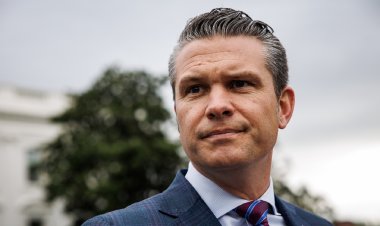Why Aren't Democrats Utilizing Their Weapon Against Elon Musk?
The portrayal and scrutiny of a left-leaning billionaire would be markedly different from the current narrative. "If he was a lefty billionaire, the attacks would look a lot different."

Clearly, the most influential immigrant in America is advocating for profound changes to the nation’s institutions. This week, Musk fueled controversy by endorsing a social media post claiming Trump's deportation plans and budget reductions would devastate the stock market. He also addressed a town hall audience, urging preparation for "temporary hardship" en route to prosperity within a dramatically restructured economic framework.
In response, Democrats and liberals have resorted to familiar critiques: labeling him an authoritarian, a bigot, a greedy plutocrat — and in the colorful terms of vice presidential candidate Tim Walz, “a dipshit."
Some Democrats believe they may be missing an opportunity: the Apartheid-era South Africa-born billionaire is an outsider meddling in America's affairs.
In a politically charged environment that emphasizes nationalism, this sentiment could resonate deeply: This individual, who has amassed his wealth in the United States, is repaying the country with continual disparagement of its culture, secretive dealings with adversaries, and admonitions to be less “woke”—much like the oppressive regime he left behind. How could he dare to attempt to alter America?
However, most of Musk's critics have refrained from this line of attack, reflecting the current political climate in Washington.
“The Democratic Party writ large has become uncomfortable speaking in the language of nationalism,” said Ruy Teixeira, a political scientist known for predicting the Obama coalition but now disillusioned with the party's shift toward a more white-collar, college-educated base. “It seems like a little bit of political malpractice. There’s potential political advantage, but they can’t act on it because of this reticence.”
“Why don’t they do it? It’s hard to imagine,” remarked Hank Sheinkopf, a veteran Democratic consultant based in New York. “The reality is that Democrats fight sitzkrieg and Republicans fight blitzkrieg.” Regarding vulgar nativism, he added that within Democratic circles, there’s a reluctance to embrace such rhetoric because it conflicts with their values.
If the roles were reversed, and Musk were an immigrant liberal actively engaged in politics, the reaction might be starkly different.
Just ask George Soros, whose foreign origins have sparked a vehement backlash against his philanthropic contributions to liberal causes. Or consider Rep. Ilhan Omar, the second-most influential African immigrant in American politics, who has faced a barrage of “go back where you came from” rhetoric. Trump himself criticized the outspoken Somali-born lawmaker, saying, “How did you do where you came from? How’s your country doing?”
“If Musk were supporting Harris, the Republicans would be very quick to brand him as this internationalist who’s not American and has no voice that should be acceptable,” added Steve Jarding, a seasoned Democratic consultant. “Democrats don’t do that. Truth is, we shouldn’t do that. And yet in politics sometimes, you have to play by their rules.”
“There’s a certain discomfort among some Democrats with nationalism, but there’s not really with patriotism,” said James Carville, the legendary strategist behind Bill Clinton’s initial presidential victory. “What is the U.S.? Is it a plot of ground or is it an idea? Is it blood and soil or is it something else? I think that’s the distinction that people make.”
This distinction makes liberals adept at promoting an inclusive, patriotic narrative while struggling to confront exclusionary sentiments that might declare certain individuals as outsiders.
Yet if Democrats were to forsake that principle, Musk would be an ideal target.
Should Trump achieve victory, it would be an ironic twist: the most provocative voice in his America-first campaign comes from someone with a lifestyle nearly antithetical to the average American experience. Musk is an immigrant, has an Ivy League education, subscribes to obscure political philosophies, and his business dealings span America's most questionable foreign adversaries. He is a tech magnate looking to transcend the traditional American dollar and a social media enthusiast who often criticizes American cultural values, leadership, and demographics.
To hear a child of the Apartheid era criticize Americans for being too woke is akin to having a North Korean defector denounce American capitalism or a wealthy newcomer from Saudi Arabia bankroll candidates arguing for less religious freedom. Perhaps there is validity in their criticism. Still, a savvy political strategist could use Musk's background to challenge his authority as a spokesperson for such causes.
In blue America, however, many struggle to raise concerns about his origins, even when they involve a country most progressives disfavor.
Trump, too, leads a life that diverges significantly from many of his core supporters. Yet he embodies a recognizable American archetype, someone who reflects a lifestyle many might aspire to with similar wealth. Musk, conversely, exists far outside conventional cultural norms. Notably, while progressives readily caricature him as a villain, they often refrain from indulging the jingoistic impulse to label him as un-American.
Musk's influence is not just a concern for election season; regardless of the election's outcome, he is poised to remain a central figure in American discourse for years.
Recently, some Democrats have cautiously broached the topic of Musk’s foreign roots, spurred by a Washington Post report revealing that he had worked unlawfully in the U.S. on a student visa. “He was violating the law,” President Joe Biden remarked. “And he’s talking about all these illegals coming our way?”
“He lied his way into citizenship and now he’s attacking us,” Carville exclaimed during a conversation.
Yet, Democratic critiques have largely centered on labeling Musk a hypocrite due to his strong anti-illegal immigration stance and promotion of conspiracy theories. Few have contended that his alleged legal missteps on his path to citizenship render him an illegitimate participant in American democracy.
Some argue this restraint is commendable—Democrats often profess to oppose the politics of delegitimization and should, therefore, embody that principle.
However, many political strategists view it differently. “Running for office is so much different than governing,” Jarding said. “When you run for office, you’re on an island, and to get to the elected position, you have to swim through a lagoon filled with sewage. It’s ugly and distasteful, but you’ve got to get elected.”
“Democrats don’t really speak nationalism,” he added. “And they don’t to their detriment.”
Sanya Singh for TROIB News
Find more stories on Business, Economy and Finance in TROIB business












